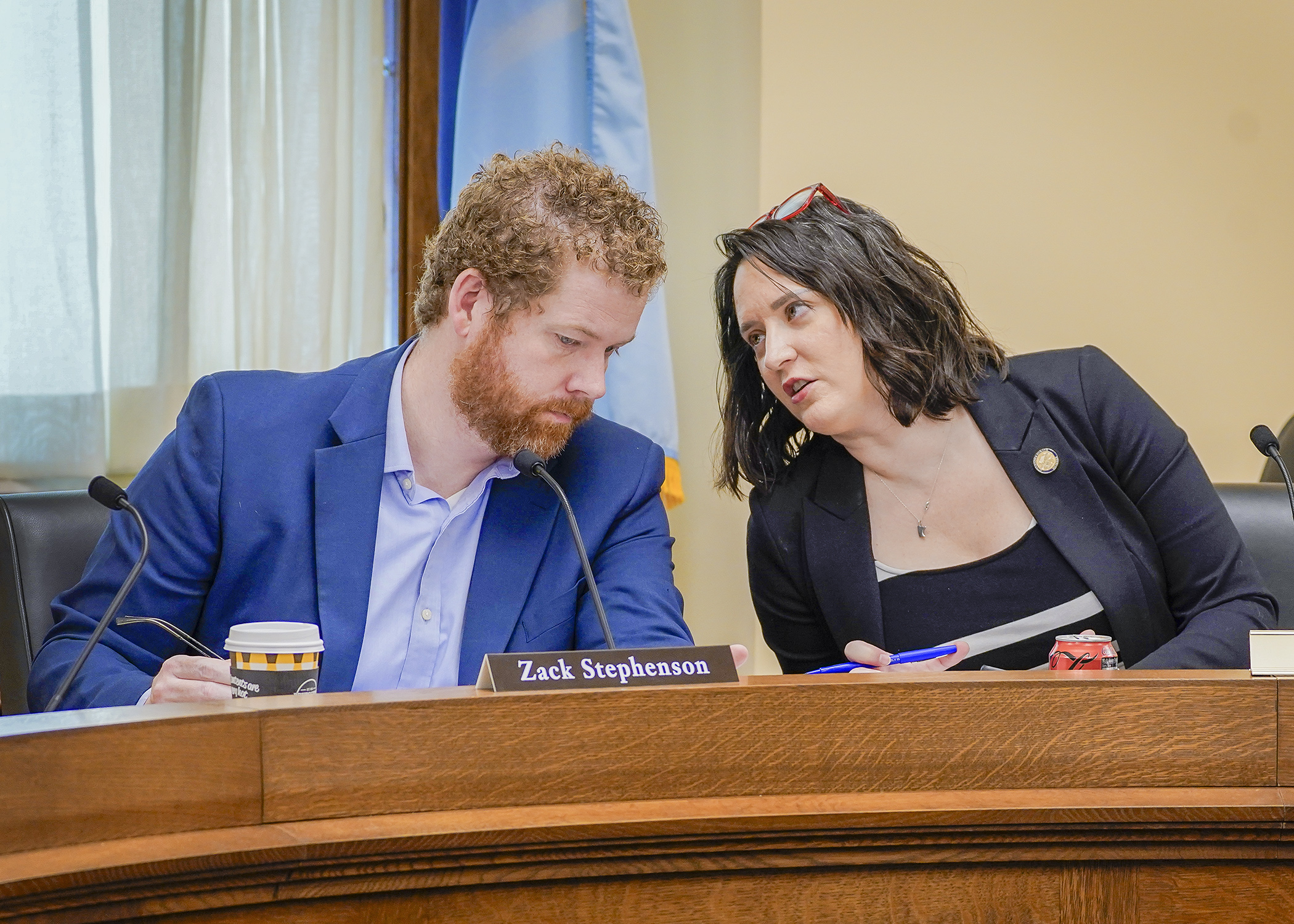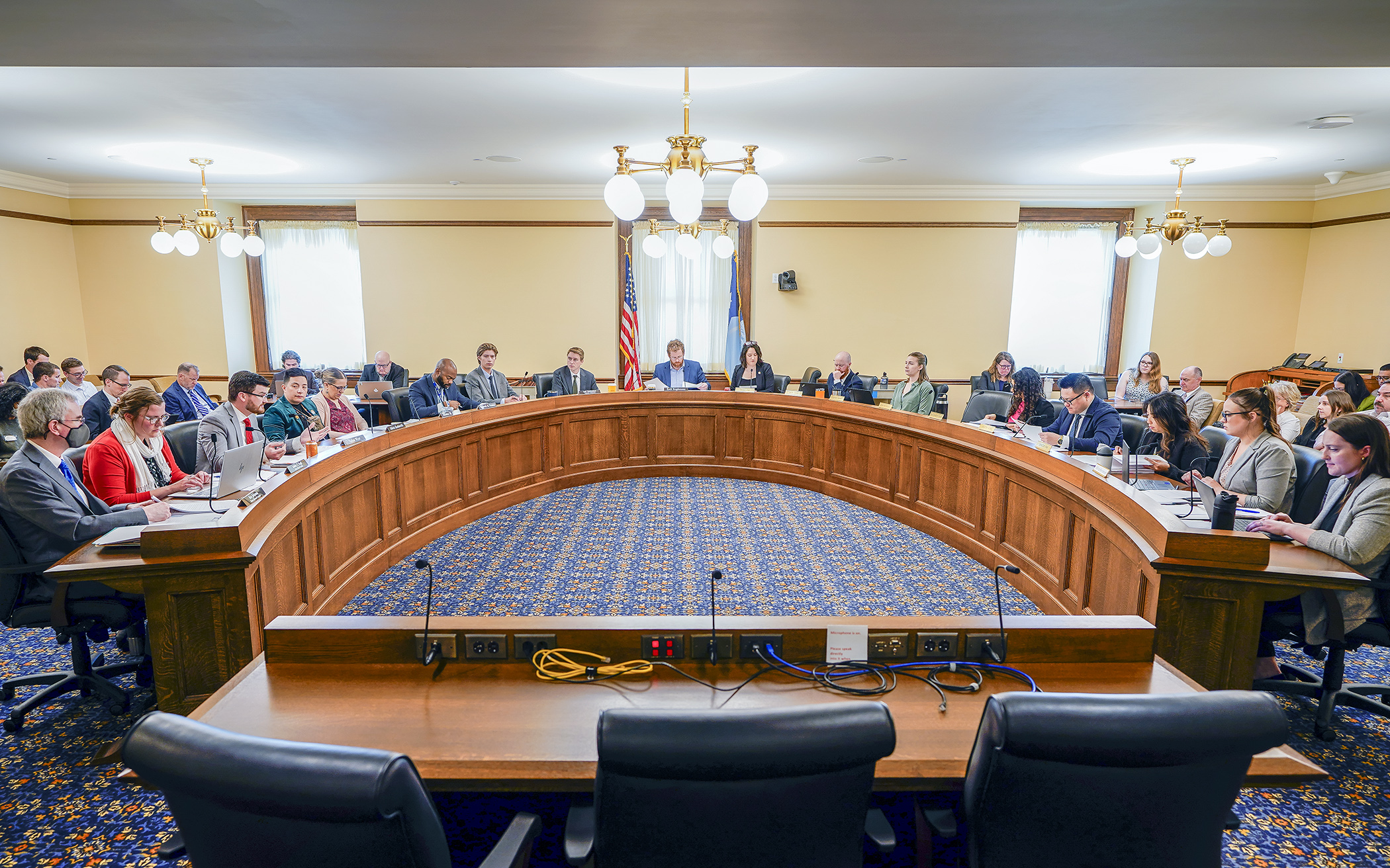Cannabis conferees successfully hash out differences, expand bill’s scope

(CORRECTION: Concerns raised by Rep. Nolan West were inaccurate in original story)
REFILED MAY 16, 2024: The cannabis regulation bill grew Wednesday. And conferees found it to be, as the kids say, “lit.”
A delete-all amendment containing the compromise language between the House and Senate bills was quickly approved by the conference committee for HF4757.
Rep. Zack Stephenson (DFL-Coon Rapids) is the sponsor.
The committee report also incorporates major commerce portions from the agriculture, energy and commerce finance and policy bill, HF4975/SF4942*, effectively turning the cannabis policy bill into the cannabis, commerce policy and finance bill.
The conference committee report now awaits House and Senate action.
An amendment successfully offered by Sen. Lindsey Port (DFL-Burnsville), a conference committee co-chair, added several commerce financial provisions to the cannabis policy conference committee bill, including a provision to appropriate $2.73 million for the Office of Cannabis Management for enforcement purposes, product testing and a reference lab. It also took language from the “Minnesota Consumer Data Privacy Act.”
What’s in the agreement?
The cannabis portion of the agreement would fine-tune legal and inter-governmental relationships among medicinal cannabis (legalized in 2014), hemp-derived THC edibles and other products (legalized in 2022), adult recreational cannabis (legalized in 2023) and the different regulatory structures governing each substance.
In a major update from 2023 law, the agreement would allow medical cannabis patients to possess 16 plants and transfer half of their allotment to a registered designated caregiver approved to assist patients enrolled in the medical cannabis program.
The idea is to help people with debilitating diseases who are enrolled in the state’s medical cannabis program to grow their own plants and obtain their medicinal plants at perhaps a lower cost than prescribed cannabis.
A retail license preapproval process operated by the Office of Cannabis Management would be established to issue licenses to potential retailers without first requiring they obtain a physical space to conduct business. This would speed up the path for retail operations to begin in the state.
The conference committee report would allow for preapproved retail licenses for “social equity applicants” defined as people harmed by over-prosecution of cannabis laws in the past. A lottery system would be implemented if there are too many applicants for retail licenses allotted to an area.
 The conference committee on the cannabis policy bill meets May 15. (Photo by Andrew VonBank)
The conference committee on the cannabis policy bill meets May 15. (Photo by Andrew VonBank)Rep. Nolan West (R-Blaine), the only Republican conferee, fears the system won’t evaluate for competence or quality of applicants, rather just rely on a minimum standard. Because no property is required to apply, he said a lottery relies on luck to find quality applicants and that is more than likely going to lead to a “disastrous market launch.”
A pair of provisions relate to the medical cannabis program, which will continue to exist and operate separately from the recreational cannabis program.
One provision would allow veterans receiving care from the Department of Veterans Affairs to be automatically eligible to enroll in the state’s medical cannabis program. The other would make medicinal cannabis available for any medical condition approved by a patient’s licensed health care practitioner.
Amendments
A dozen mostly technical amendments successfully offered by Port range from how cannabis business owners receive license renewal and expiration notices to specifying the procedures for transferring funds to the Office of Cannabis Management.
West unsuccessfully offered five amendments around a common theme of desiring to avoid what he called the “impending failure” of the launch of cannabis retail sales anticipated to begin in the summer of 2025.
The cannabis management office won’t be able to issue cultivator licenses in time for cannabis producers to produce sufficient crops to meet the demand for retail cannabis, he said.
To that end, he offered an amendment to let existing medical cannabis manufacturers sell some of their cannabis stock at retail recreational cannabis stores under certain conditions.
Related Articles
Search Session Daily
Advanced Search OptionsPriority Dailies
Legislative leaders set 2026 committee deadlines
By Lisa Kaczke Legislative leaders on Tuesday officially set the timeline for getting bills through the committee process during the upcoming 2026 session.
Here are the three deadlines for...
Legislative leaders on Tuesday officially set the timeline for getting bills through the committee process during the upcoming 2026 session.
Here are the three deadlines for...